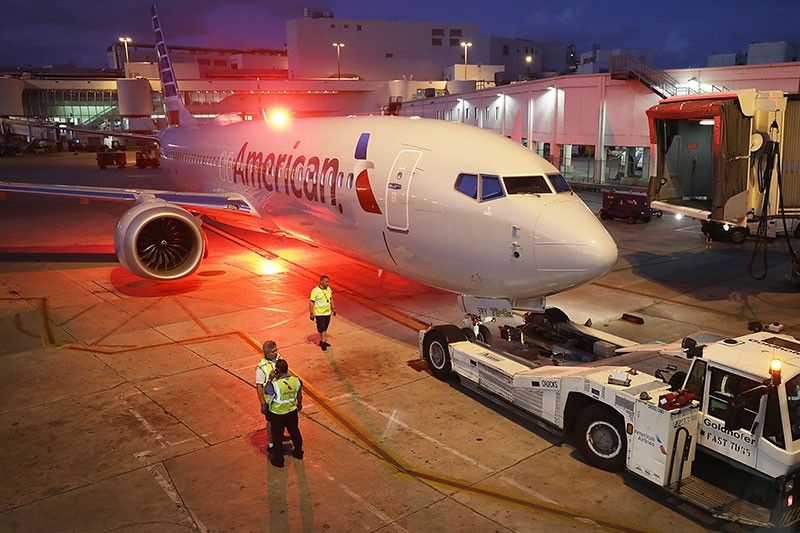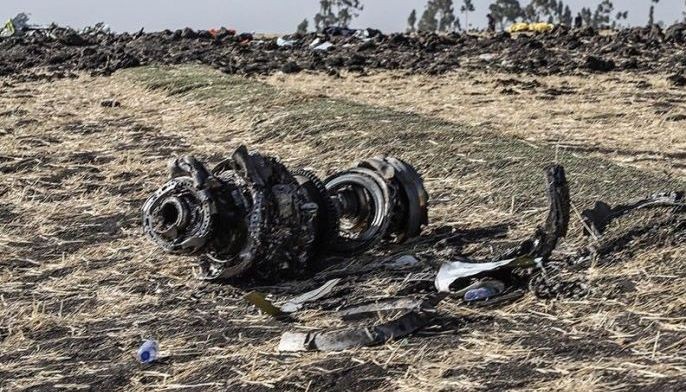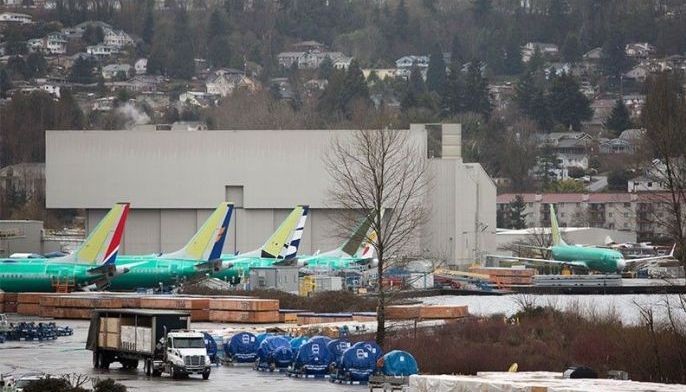US grounds Boeing 737 MAX amid growing safety concerns

WASHINGTON, United States — The ban on the Boeing 737 MAX aircraft became worldwide on Wednesday after US President Donald Trump joined Canada and other countries in grounding the aircraft amid mounting global fears for the jets' airworthiness.
US authorities said new evidence showed similarities between Sunday's deadly crash of an Ethiopian Airlines Boeing 737 MAX 8 and a fatal accident in Indonesia in October.
The Federal Aviation Administration said findings from the crash site near Addis Ababa and "newly refined satellite data" warranted "further investigation of the possibility of a shared cause for the two incidents."
The FAA issued an emergency order grounding 737 MAX 8 and MAX 9 aircraft until further notice.
Trump told reporters at the White House the "safety of the American people and all peoples is our paramount concern."
Earlier on Wednesday, Canada had also joined the long list of countries to ban the plane from flying in their airspaces and many airlines have voluntarily taken it out of service.
Ethiopia said it would send the black boxes from Flight ET 302 to France for analysis which could provide crucial information about what happened.
"Hopefully they will come up with an answer but until they do the planes are grounded," Trump said of the planes.
FAA acting chief Daniel Elwell said the agency has been "working tirelessly" to find the cause of the accident but faced delays because the black box flight data recorders had been damaged.
The new information shows "the track of that airplane was close enough to the track of the Lion Air flight... to warrant the grounding of the airplanes so we could get more information from the black boxes and determine if there's a link between the two, and if there is, find a fix to that link," Elwell said on CNBC.
In Miami, a large hub for US air travel, passengers formed growing lines to reschedule after canceled flights.
Boeing chief Dennis Muilenburg said he supported the US decision "out of an abundance of caution" but continued to have "full confidence" in the safety of the plane.
The company continues its efforts "to understand the cause of the accidents in partnership with the investigators, deploy safety enhancements and help ensure this does not happen again," Muilenburg said in a statement.
The accounts of the recent crashes were echoed in concerns registered by US pilots on how the MAX 8 behaves.
Pilots concerns
At least four American pilots made reports following the Lion Air crash, all complaining the aircraft suddenly pitched downward shortly after takeoff, according to documents reviewed by AFP on the Aviation Safety Reporting System, a voluntary incident database maintained by NASA.
In two anonymous reports on flights just after the Lion Air crash, pilots disconnected the autopilot and corrected the plane's trajectory.
One said the flight crew reviewed the incident "at length... but can't think of any reason the aircraft would pitch nose-down so aggressively."
It was unclear if US transportation authorities review the database or investigate the incidents. However, the FAA said this week it had mandated that Boeing update its flight software and training on the aircraft.
Questions on the Lion Air crash have honed in on an automated stall prevention system, the MCAS, designed to automatically point the nose of the plane downward if it is in danger of stalling.
According to the flight data recorder, the pilots of Lion Air Flight 610 struggled to control the aircraft as the MCAS repeatedly pushed the plane's nose down following takeoff.
The Ethiopian Airlines pilots reported similar difficulties before their aircraft plunged into the ground as they tried to return to the airport.
Boeing was criticized after the Lion Air crash for allegedly failing to adequately inform 737 pilots about the functioning of the stall prevention system.
Ethiopian Airlines CEO Tewolde GebreMariam on Sunday said the captain on the flight, Yared Mulugeta Getachew, 29, was an experienced aviator with more than 8,000 flight hours.
Andrew Hunter, a defense industry expert at the Center for Strategic and International Studies in Washington, said that, while Boeing and the FAA had good track records on addressing safety concerns, sometimes the combination of automated systems and humans did not work smoothly.
"It is hard to get a system to work seamlessly with human beings," he told AFP.
"The fact the system was fighting the pilot was not an unintended consequence," because it should counteract a pilot error and correcting this is "challenging."
"I'm not sure the fix here was quite so easy," Hunter said.
Banned from the skies
In Ethiopia, distraught families wept and lit candles as they visited the deep black crater where the plane smashed into a field, killing 157 passengers and crew, an AFP correspondent said.
The Ethiopian Airlines 737 MAX 8 was less than four months old when it went down six minutes into a flight from Addis Ababa to Nairobi on Sunday, disintegrating on impact.
Families of the victims from Kenya, China, the United States and Canada, as well as diplomatic staff from embassies, were visiting the crash site.
A dozen airlines have grounded the plane, while Nigeria, Lebanon, Egypt, Serbia, Vietnam, New Zealand and Hong Kong on Wednesday also joined the list of countries to ban it from their airspace.
The European Union and major hubs such as the United Arab Emirates and Australia had already done so.
American Airlines said it was informed of the FAA decision earlier in the day and had 24 aircraft affected by the US ban, while Southwest Airlines said it was still confirming the move.
The MAX series is Boeing's fastest-selling model, with more than 5,000 orders placed to date from about 100 customers.
There are 74 of the planes registered in the United States, and 387 in use worldwide with 59 carriers, according to the FAA.
Low-cost airline Norwegian Air Shuttle has said it would demand financial compensation from Boeing as the implications of the mass grounding for the airline industry remained unclear.
Shares in the company rose Wednesday on Wall Street despite the US order but were still down 10.6 percent since before Sunday's crash.
Ethiopia's parliament has declared Monday a day of national mourning after a Nairobi-bound Ethiopian Airlines plane crashed, killing all 157 people onboard.
"The House of People's Representatives have declared March 11, 2019, a national day of mourning for citizens of all countries that have passed in this tragic accident," the office of Ethiopia's Prime Minister Abiy Ahmed said on Twitter on Sunday. — AFP
The country's transport minister says the 2019 Ethiopian Airlines plane crash which killed 157 people was caused by a flight software failure as suspected, citing the investigators' final report.
The crash of the Nairobi-bound Boeing 737 MAX six minutes after take-off from Addis Ababa on March 10, 2019, which killed all passengers and crew aboard, triggered the global grounding of the MAX and the worst crisis in Boeing's history.
It came just months after the October 2018 crash of a 737 MAX operated by Lion Air in Indonesia, which killed 189 people when it crashed moments after leaving Jakarta airport. — AFP
US aviation regulators plan to require Boeing to rewire all 737 MAX aircraft before allowing the troubled planes fly again, the Wall Street Journal has reported.
The MAX has been grounded worldwide since an Ethiopian Airlines flight crashed shortly after take-off last March, less than six months after the same model was involved in a similar fatal accident in Indonesia.
Both accidents saw uncontrolled drops in the aircraft's nose in the moments before the planes crashed, which investigators have blamed on the model's anti-stall flight system.
Regulators have since concluded that the current wiring layout violated safety standards to prevent short-circuits that could cause similar sharp drops in aircraft pitch, the newspaper said Sunday.
The order to modify the wiring would apply to the nearly 800 MAX plans already produced, including those already in the hands of airlines, according to the report. — AFP
The Ethiopian transport minister says the crew of the Ethiopian Airlines plane that crashed last month killing 157 people, repeatedly followed procedures recommended by Boeing, but were unable to regain control of the jet.
"The crew performed all the procedures repeatedly provided by the manufacturer but was not able to control the aircraft," says Dagmawit Moges, unveiling results of the preliminary probe into the crash. — AFP
Investigators probing the fatal crash of a Boeing 737 Max in Ethiopia have reached a preliminary conclusion that a suspect anti-stall system activated shortly before it nose-dived to the ground, the WSJ reports citing people familiar with the matter.
The findings were based on flight recorder data and represented the strongest indication yet that the system, known as MCAS, malfunctioned in both the Ethiopian Airlines crash on March 10 and the Lion Air crash in Indonesia last year, the Wall Street Journal says.
The two crashes killed a total of 346 people. — AFP
French investigators have received the black boxes from the Boeing 737 MAX that crashed east of Addis Ababa in Ethiopia, killing all 157 people on board, France's BEA airline safety agency says.
Ethiopian authorities had requested French help to analyze the content of the flight data recorder and cockpit voice recorder to discover what caused the Ethiopian Airlines flight to plunge to the ground just minutes after takeoff on Sunday.
- Latest
- Trending



































